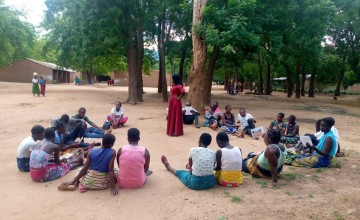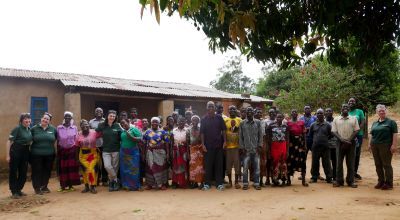
Read our 2023 annual report

Knowledge Hub
Employment and business opportunities, particularly opportunities outside of the agricultural sector, are limited in Malawi.
The country’s volatile economy, unstable currency and limited access to raw materials pose significant challenges for budding entrepreneurs, along with gaps in business, literacy and numeracy skills, which can help to effectively manage a small business enterprise. Over 80% Malawians live in rural areas, many with limited access to the trading centres that support commerce.
Our Business Skills Training module, taught in the context of Concern’s EU and Irish Aid funded RAISE programme (Raising Assets and Income for a Sustainable Environment in Malawi), supports aspiring entrepreneurs from rural areas of the Chikwawa, Mwanza, Neno and Nsanje districts in southern Malawi. The curriculum targets budding entrepreneurs who have expressed an interest in running a business and have the capacity to do so. The sessions cover 17 aspects of micro-enterprise management, including market assessments, planning, operation, risks, and budget management.
The programme’s participants are drawn from poor and extremely poor households who receive social protection under the Government of Malawi’s social cash transfer programme. Many of the households have low literacy skills, so the programme uses graphic-based educational materials, developed for a Malawian context and designed to support the participants’ learning journeys using adult education approaches.
This business skills training will help me to know the areas of weakness and strength in my business
The materials support and reinforce the messages taught during training sessions, and include activities to assist participants in developing business plans and managing records to improve their business performance.
"I have been running the business since 2015 but I have never kept records,” explained Selemani Oka, a programme participant from TA Malemia, Nsanje district. “This business skills training will help me to know the areas of weakness and strength in my business.”
The training sessions are delivered by our field based staff, who support participants and work closely with the wider community through the programme. Following the training, the participants received a capital transfer, contributing to making their business plans a reality.
Managing finances is a key element of the training. Trainees learn the importance of keeping their businesses’ money separate from their family money, good record keeping practices, and protecting their families’ resilience as well as maintaining the businesses’ cash flow. The business owners are encouraged to put money aside for future business expenses.
Participants are then introduced to a variety of financing options available to micro-enterprises, making them aware of the benefits as well as the costs and risks involved in each option. Trainees are encouraged to work closely with their own communities as their future customers, and to get to know their customers’ needs and preferences, as well as the strengths and weaknesses of their competitors. Businesses should establish themselves in favourable locations, places with large numbers of passing customers, without inconveniencing other members of the community.

The focus on building business relationships encourages the participants to build support within their communities and to develop a network of other business owners, particularly those business owners who work in their industry. Participants learn how to seek technical information from suppliers, extension workers, and lead farmers.
Lucia Phiri told us that she has learned that “building good relationships with customers as well as people of the same industry will help me to deal with challenges I face as a businesswoman”.
To maintain the support of their communities, trainees are encouraged to focus on providing high quality goods and services that are correctly priced. The training explores different pricing structures with the participants, emphasising that the price charged should be sufficient to cover all of their costs, including upcoming business costs, and to generate a profit for the business. The price of the goods should reflect the quality of the goods – that is, higher quality goods should be priced at a higher rate.
The field staff explain the need for a business to provide high quality goods and reliable and consistent quality. To ensure quality, the participants learn the importance of maintaining their equipment and tools, including budgeting for regular servicing.

The training also stresses the need to be disciplined to achieve the participants’ plans for the future. Trainees learn how to assess future risks to their business – and how to reduce those risks – and are encouraged to make daily and weekly plans outlining how they will meet their commitments to their customers and build their businesses’ resilience.
As part of the programme, participants are also linked with government Adult Literacy courses, which are targeted to adult learners in the communities and assist business owners to improve their literacy and numeracy skills.
Shamim Samson, a Concern field staff member in Nsanje, has been facilitating RAISE business training over the past year and has seen the benefits.
“The business skills training is essential for households who have previous business experience,” Shamim said. “It helps them to realise what was holding their businesses back and how to overcome these challenges. Meanwhile, the participants who have never run a business before are prepared for the realities of commerce and are able to plan for success.”
Organisations who fund us





